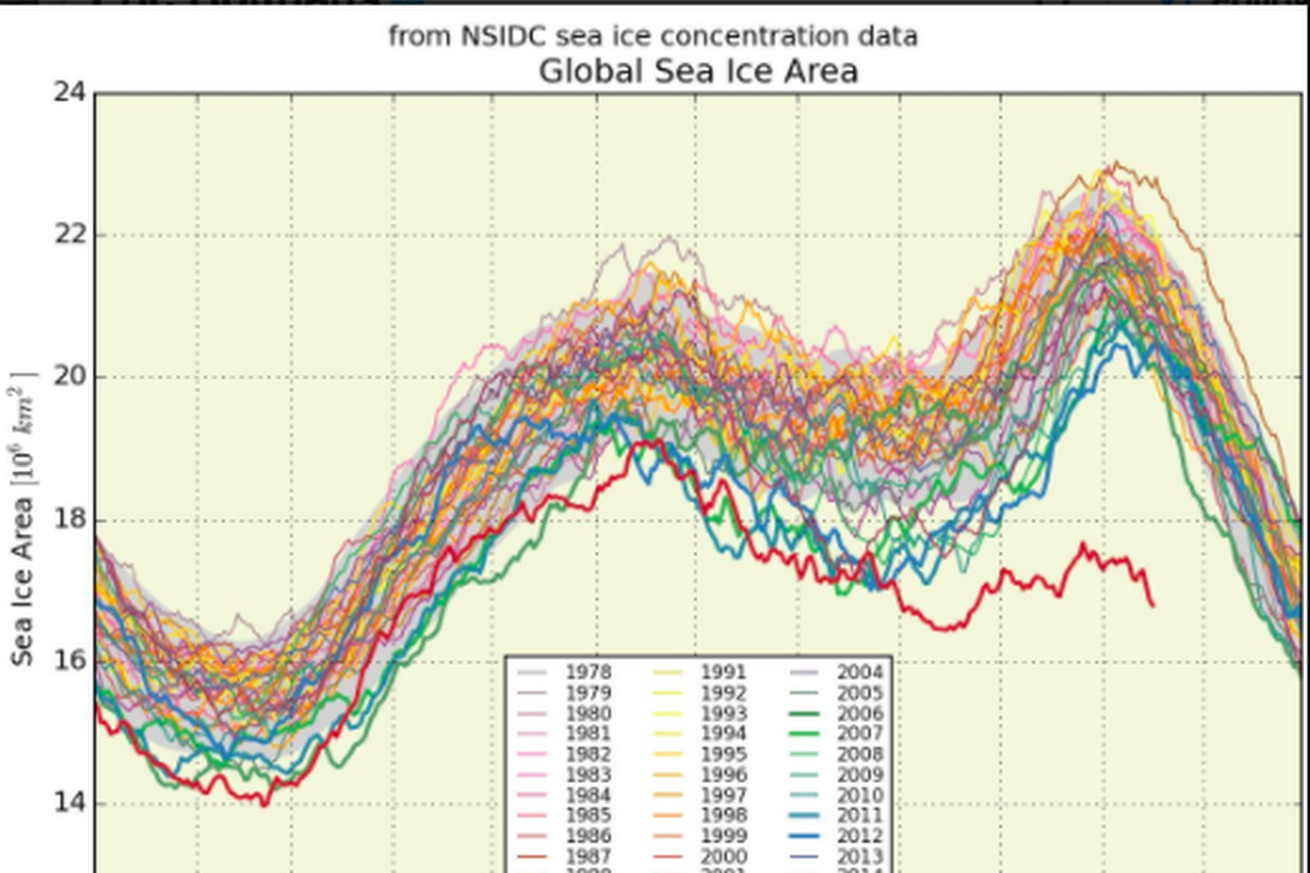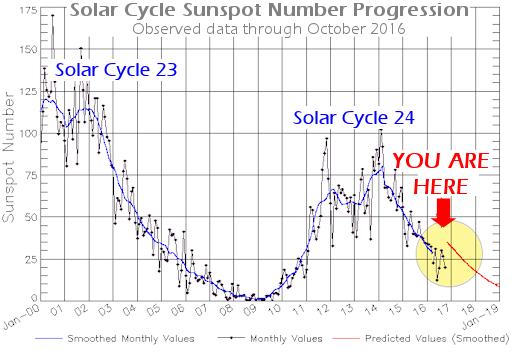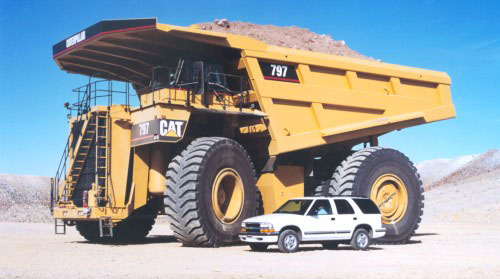You got high hopes I see.
Prepare for disappointment.
Perhaps. I suspect he'll either rule for 2 years, or 16. It all depends on whether he can stand doing the job.
You got high hopes I see.
Prepare for disappointment.
Perhaps. I suspect he'll either rule for 2 years, or 16. It all depends on whether he can stand doing the job.
Perhaps. I suspect he'll either rule for 2 years, or 16. It all depends on whether he can stand doing the job.
This is the third straight year of record warmth.

Also global sea ice extent is the lowest on record.

CO2 is also continuing to climb.

And fyi, solar output is down.

But hey we have a nominee for the EPA that doesn't want to tell us what his position is on climate change!
I think he's extremely well suited to the Job.
Perhaps the best ever.
16? :freak:
he's already 70


Look at that huge drop at the end of the year. The low extent in sea for November is an anomaly. Weather is not climate.
Indeed weather is not climate. But weather receives signals from the climate. Low sea ice extent is an anomaly, but it's an anomaly made far more likely by a warming climate. It's another piece of data that tells you the same thing the temperature averages are telling you. Temperatures around the globe are rising. Climate and weather are both noisy, but the overall trend is up and has been that way for decades.
It's actually been that way for centuries. There have been greater spurts of warming even in the recent past before there was any significant industrialization.
Such as?
The first instrumental record of global temperatures was kept in Central England from 1659. From 1695-1735, a period of 40 years preceding the onset of the Industrial Revolution in 1750, temperatures in central England, which are a respectable proxy for global temperatures, rose by 2.2 K (4 F°). Yet global temperatures have risen by only 0.65 K (1.2 F
°) since 1950, and 0.7 K (1.3 F°) in the whole of the 20th century.
https://www.google.com/amp/s/bbickm...e-monckton-files-we-are-the-world/amp/?client
No, one location on earth is not a proxy for global temperature, especially not central England. Why? because the climate of the UK is strongly affected by ocean currents. If the ocean currents change a little, temperature can change a lot.
Other problem with your story is Thermometers as we know them today didn't exist. Something like thermometers existed but there was no standard scale in place, so measurements can't really be compared.
Evidence? Recent climate change has not borne that out at all. The northernmost parts of the world are changing much faster than the rest of the world.I didn't say a proxy for temperature; it is a proxy for rate of change. Generally, when there is a fast ride in temperature globally, you will find many local areas also rising in temperature rapidly.
As for the thermometers.....they read temperature. It doesn't matter if the actual temperature was off,, it matters how much the temperature changed in a period of time.
If we use your logic, all temperature readings before 1950 should not be used to show temperature change over time.
| Our knowledge of climate history shows that sustained climate change can bring us to “tipping points” where the changes become even more rapid. Even if “change” isn’t necessarily bad, exceptionally rapid change can cause all sorts of problems. E.g., humans and other organisms might have to move to survive if climate conditions change, sea level rapidly rises, and so on. This will be expensive and disruptive for humans–I expect wars will be fought over it. It could be much more traumatic for many other organisms, however. What happens when animals have to migrate to new areas, but the plants they depend on can’t move fast enough to keep up with shifting climate zones? The animals’ habitat shrinks, that’s what. Second, do we really want to push the climate into Paleozoic conditions over one or two hundred years, for Pete’s sake? |
| Once again, Monckton has mistaken local climate variation (this time in central Greenland) for global variation. The IPCC warns, [L]ocal changes must not be confused with global changes. Local climate changes are often much larger than global ones, since local factors (e.g., changes in oceanic or atmospheric circulation) can shift the delivery of heat or moisture from one place to another and local feedbacks operate (e.g., sea ice feedback). Large changes in global mean temperature, in contrast, require some global forcing (such as a change in greenhouse gas concentration or solar activity). This is even more true of a place like Greenland than others, because global temperature changes are amplified in the Arctic relative to other places on the globe, including Antarctica. The huge Southern Ocean acts as a heat sink and dampens temperature changes around Antarctica. |
Evidence? Recent climate change has not borne that out at all. The northernmost parts of the world are changing much faster than the rest of the world.
Wow, so much ignorance in one post. You can't know how much temperature changes or how fast if nobody knows what a degree is! This is why climate scientists show the global temperature record starting in 1860.
It's like you think it doesn't matter if you measure something in feet or inches. You can't compare two sets of numbers that were measured in different units. And before standardization, you can't be sure what units were actually used since everyone made up their own.
Your source is also a blog posting quote of someone else that actually being ATTACKED by the author of the posting! (I guess you didn't read it)
Here's what the actual author of your link says about rate of change:
Our knowledge of climate history shows that sustained climate change can bring us to “tipping points” where the changes become even more rapid. Even if “change” isn’t necessarily bad, exceptionally rapid change can cause all sorts of problems. E.g., humans and other organisms might have to move to survive if climate conditions change, sea level rapidly rises, and so on. This will be expensive and disruptive for humans–I expect wars will be fought over it. It could be much more traumatic for many other organisms, however. What happens when animals have to migrate to new areas, but the plants they depend on can’t move fast enough to keep up with shifting climate zones? The animals’ habitat shrinks, that’s what.
Second, do we really want to push the climate into Paleozoic conditions over one or two hundred years, for Pete’s sake?
And here's what he says about local vs. global variation.
Once again, Monckton has mistaken local climate variation (this time in central Greenland) for global variation. The IPCC warns,
[L]ocal changes must not be confused with global changes. Local climate changes are often much larger than global ones, since local factors (e.g., changes in oceanic or atmospheric circulation) can shift the delivery of heat or moisture from one place to another and local feedbacks operate (e.g., sea ice feedback). Large changes in global mean temperature, in contrast, require some global forcing (such as a change in greenhouse gas concentration or solar activity).
This is even more true of a place like Greenland than others, because global temperature changes are amplified in the Arctic relative to other places on the globe, including Antarctica. The huge Southern Ocean acts as a heat sink and dampens temperature changes around Antarctica.
So maybe you should actually read your links next time. :chuckle:

do you have any idea how much strip mining will increase to meet the demand for rare earth metals for next generation batteries and motors?
and tesla ain't gonna make these babies :banana:



This is the third straight year of record warmth.

Also global sea ice extent is the lowest on record.

CO2 is also continuing to climb.

And fyi, solar output is down.

But hey we have a nominee for the EPA that doesn't want to tell us what his position is on climate change!

